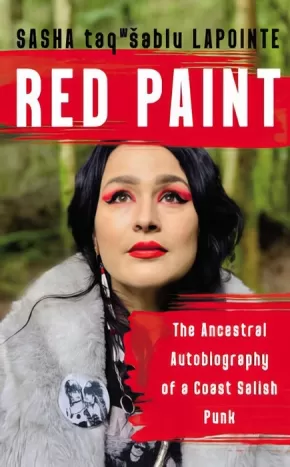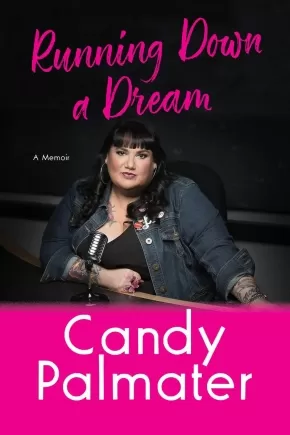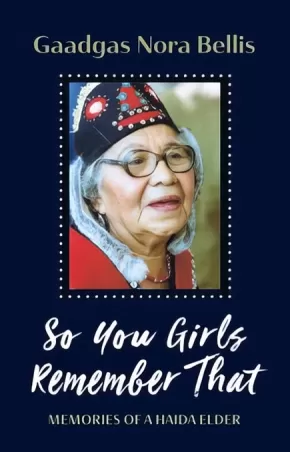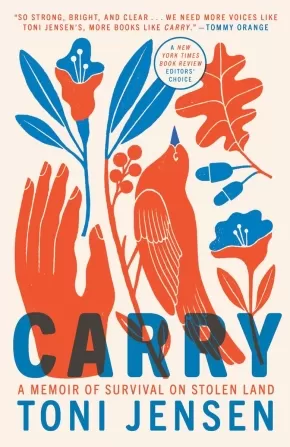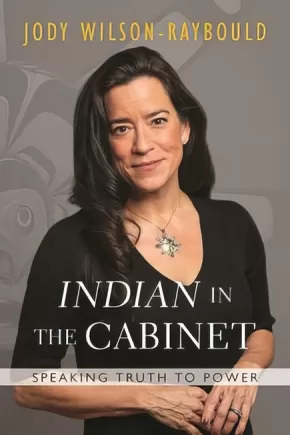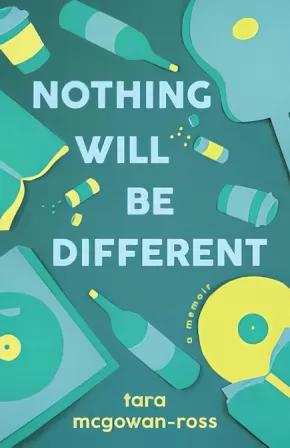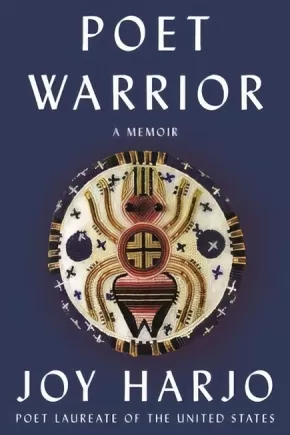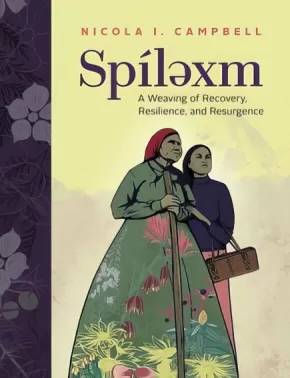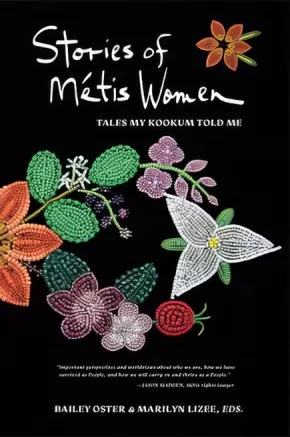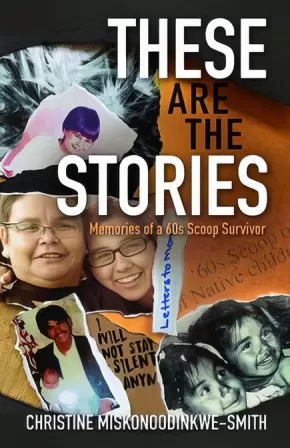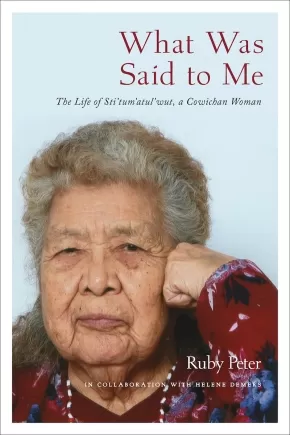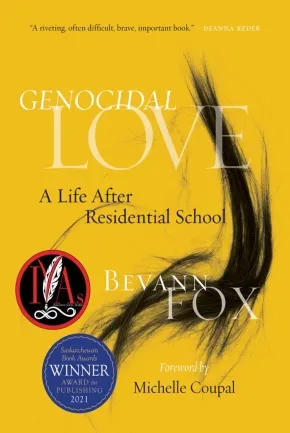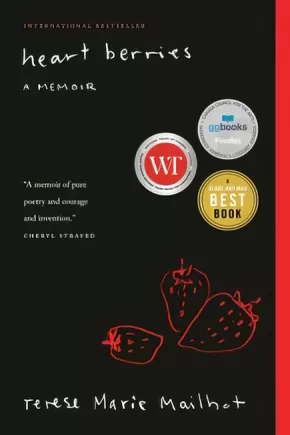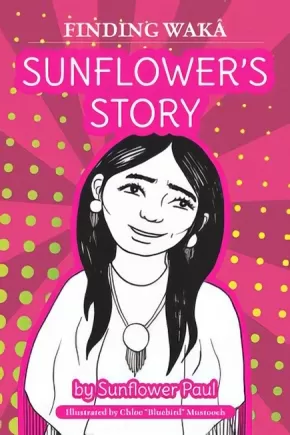
Women's Studies
31
-
45
of
73 Results;
Sort By
Go To
of 5
Red Paint: The Ancestral Autobiography of a Coast Salish Punk (HC) (1 in Stock)
$33.00
Format:
Hardcover
Text Content Territories:
Indigenous American; Native American; Salish; Coast Salish; Nooksack; Upper Skagit;
Grade Levels: 12; University/College;
ISBN / Barcode: 9781640094147
Synopsis:
Synopsis:
An Indigenous artist blends the aesthetics of punk rock with the traditional spiritual practices of the women in her lineage in this bold, contemporary journey to reclaim her heritage and unleash her power and voice while searching for a permanent home.
Sasha taqʷšəblu LaPointe has always longed for a sense of home. When she was a child, her family moved around frequently, often staying in barely habitable church attics and trailers, dangerous places for young Sasha.
With little more to guide her than a passion for the thriving punk scene of the Pacific Northwest and a desire to live up to the responsibility of being the namesake of her beloved great-grandmother—a linguist who helped preserve her Indigenous language of Lushootseed—Sasha throws herself headlong into the world, determined to build a better future for herself and her people.
Set against a backdrop of the breathtaking beauty of Coast Salish ancestral land and imbued with the universal spirit of punk, Red Paint is ultimately a story of the ways we learn to find our true selves while fighting for our right to claim a place of our own.
Examining what it means to be vulnerable in love and in art, Sasha offers up an unblinking reckoning with personal traumas amplified by the collective historical traumas of colonialism and genocide that continue to haunt native peoples. Red Paint is an intersectional autobiography of lineage, resilience, and, above all, the ability to heal.
Awards
- Winner of the 2023 Pacific Northwest Book Award
Reviews
"Red Paint is a miraculous book. Sasha LaPointe walks us through the sites of her evisceration while rebuilding a home within her body using sturdy materials: rose quartz, cedar bark, red clay, and the words of her ancestors. With each potent sentence, she shows us what access to power looks like. She shows us how to become whole.” —Elissa Washuta, author of White Magic
"As luminous as the morning sun over the fir forests, Red Paint is a story of where strength takes us. Sasha taqwšəblu LaPointe goes looking to the past to help heal from terrible traumas, finding inspiration in her ancestors, the Salish people. This is a book destined to be a classic. Read it." —Rene Denfeld, bestselling author of The Child Finder
Additional Information
240 pages | 5.31" x 8.29" | Hardcover
Running Down a Dream: A Memoir
$32.99
Format:
Hardcover
Text Content Territories:
Indigenous Canadian; First Nations; Mi'kmaq;
Reading Level: N/A
ISBN / Barcode: 9781443455091
Synopsis:
Synopsis:
A powerful, often funny, always inspiring memoir from a beloved comedian, professional orator, actor, entertainer, gone all too soon.
Candy Palmater loved to connect with people. She lived for the stage, her effervescent presence on television and radio ignited and inspired audiences, touching them with her warm, often spicy humour as well as her positive message about love and kindness. And she always believed that it is never too late to pursue our dreams and that we should never allow others to negatively influence our life’s desires.
Candy described herself as a queer Mi’kmaw lawyer-turned-comic raised by bikers in rural New Brunswick and on the surface, she met with enormous success – on leaving government and the practice of law, she started a career as a stand-up comedian, which led to starring in five successful seasons of her own national TV show, hosting many radio shows and co-guest hosting CTV’s The Social, and landing a recurring role on a hot new sitcom in her fifties. But she is the first to tell you she made all kinds of mistakes and experienced all kinds of failure along the way. Running Down a Dream is Candy’s story, in her own words, of the highs, the lows, the moments of doubt, the turning points when she listened to her gut and tuned out all the people saying no. It’s also a tribute to her family and the love that always bolstered her, despite their own hard times. She shares her stories to inspire us to embrace our failures and to believe in ourselves. And most importantly, Running Down a Dream is a call to love ourselves for who we are.
The world lost Candy in late 2021, and yet she left us with this gift -- a memoir and a message that will inspire us for years to come.
Additional Information
304 pages | 6.00" x 9.00" | Hardcover
So You Girls Remember That: Memories of a Haida Elder
$22.95
Format:
Paperback
Text Content Territories:
Indigenous Canadian; First Nations; Haida;
Grade Levels: 12; University/College;
ISBN / Barcode: 9781550179774
Synopsis:
Synopsis:
Collected wisdoms, reflections and stories from Indigenous Elder Naanii Nora of the Haida Nation.
So You Girls Remember That is an oral history of a Haida Elder, Naanii Nora, who lived from 1902 to 1997. A collaborative effort, this project was initiated and guided by Charlie Bellis and Maureen McNamara and was years in the making. The resulting book, compiled by Jenny Nelson, is a window into Nora’s life and her family—from the young girl singing all day in the canoe, bossing her brothers around or crossing Hecate Strait on her dad’s schooner, to the young woman making her way in the new white settlers’ town up the inlet, with music always a refrain—these are stories of childhood; of people and place, seasons and change; life stages and transitions such as moving and marriage; and Haida songs and meanings.
This book also contains the larger story of Nora’s times, a representation of changing political relationships between Canada and the Haida people and a personal part of the Haida tale.
What ultimately shines through is Nora’s singular and dynamic voice speaking with the wisdom of years. For example, on giving advice she says: “I like to give anybody advice because when you’re young you don’t know nothing on this world. What’s coming; what’s going … You have to remember it’s a steep hill; you’re right on the top. You slide down anytime if you don’t be careful.”
This is a work of great generosity, expressing Nora’s spirit of living—her joy, humour, spirituality and resourcefulness; her love of children, music and social life; her kindness, strong will and creativity; and her spirit that has nurtured a community and endures to this day.
Royalties will be donated to the Carl Hart Legacy Trust through the Haida Gwaii Community Foundation, to support the Rediscovery Camp at T'aalan Stl'ang.
Reviews
"You can tell if someone has ever met Naanii Nora Brown Bellis Yahgulanaas as the mere mention of her name will make them smile." –Michael Nicoll Yahgulanaas, author of Carpe Fin: A Haida Manga
"Reading my Nanny’s stories in So You Girls Remember That, filled me with emotions. It brought me back to Nanny’s strong warm hugs and her cheeky demeanor, memories of her cluttered house and all the time spent with her. As a Haida, and a father, I worry about the rapidly advancing world, where we are now and where we’re heading. Nanny has laid the blueprint for tackling such worries. Her words remind us to always believe in ourselves, and that love of family and community are essential, not only for survival but also for the flourishing of love, laughter and music." –Tyler Hugh Charlie Bellis, played the melodica in grades 6 and 7 at Tahayghen elementary school
Additional Information
240 pages | 5.50" x 8.50" | Paperback
Carry: A Memoir of Survival on Stolen Land
$24.00
Format:
Paperback
Text Content Territories:
Indigenous American; Métis;
Grade Levels: 12; University/College;
ISBN / Barcode: 9781984821201
Synopsis:
Synopsis:
Toni Jensen grew up around guns: As a girl, she learned to shoot birds in rural Iowa with her father, a card-carrying member of the NRA. As an adult, she’s had guns waved in her face near Standing Rock, and felt their silent threat on the concealed-carry campus where she teaches. And she has always known that in this she is not alone. As a Métis woman, she is no stranger to the violence enacted on the bodies of Indigenous women, on Indigenous land, and the ways it is hidden, ignored, forgotten.
In Carry, Jensen maps her personal experience onto the historical, exploring how history is lived in the body and redefining the language we use to speak about violence in America. In the title chapter, Jensen connects the trauma of school shootings with her own experiences of racism and sexual assault on college campuses. “The Worry Line” explores the gun and gang violence in her neighborhood the year her daughter was born. “At the Workshop” focuses on her graduate school years, during which a workshop classmate repeatedly killed off thinly veiled versions of her in his stories. In “Women in the Fracklands,” Jensen takes the reader inside Standing Rock during the Dakota Access Pipeline protests and bears witness to the peril faced by women in regions overcome by the fracking boom.
In prose at once forensic and deeply emotional, Toni Jensen shows herself to be a brave new voice and a fearless witness to her own difficult history—as well as to the violent cultural landscape in which she finds her coordinates. With each chapter, Carry reminds us that surviving in one’s country is not the same as surviving one’s country.
Reviews
“Like a murmuration of starlings, Toni Jensen’s new book Carry changes its shape constantly and effortlessly. . . . The value of Carry lies in its unique structure, its sparse, powerful prose, and in the stinging perspective it provides on events that are numbingly common. Until we see it as clearly as Jensen does, the lens she offers on gun violence in America will be relevant again and again and again.”—Chicago Review of Books
“In Carry, Jensen scours language to find a new way of writing about how historical injustices seep into the present. . . . With a controlled voice like a Philip Glass composition, smooth, meandering yet repetitive, Jensen considers her troubled past and begins the work of stitching herself back together. . . . An unsettling account that creeps into your bones.”—The New York Times Book Review
“Toni Jensen grew up around guns. But bird-hunting with her father was a much different experience than staring down bored barrels at Standing Rock. A new and much-needed voice, Métis author Jensen shares her deepest thoughts and most emotional experiences in Carry.”—Bustle
“Toni Jensen’s memoir is stunning. There’s no other words that come to mind—it’s about growing up Métis, existing as an Indigenous woman in America, and the looming threat of ever-pervasive gun violence. . . . A must-read.”—Alma (Alma’s Favorite Books for Fall 2020)
“Moving between personal recollections and historical observations, Jensen narrates what it means to be Métis, and what it feels like to be connected by bodies and land. . . . A meditative exploration of people and place that shows what it means to live and survive.”—Library Journal
“[A] debut memoir from a Native author enmeshed in the American way of violence, alienation, and death . . . a powerful rejection of a culture that has always been grounded in violence and intimidation.”—Kirkus Reviews
“Carry explores the gun’s tragic impact with heartfelt prose and deep intellect—on politics, on history, on Black and Indigenous bodies, on women’s bodies, and on children behind closed doors . . . It is full of difficult and vital news, delivered right on time.”—Terese Marie Mailhot, New York Times bestselling author of Heart Berries
Additional Information
304 pages | 5.24" x 7.94" | Paperback
Indian in the Cabinet: Speaking Truth to Power
$34.99
Format:
Hardcover
Text Content Territories:
Indigenous Canadian; First Nations; Kwakwaka'wakw (Kwakiutl); Musgamagw Tsawataineuk; Ligwilda'wx (Laich-kwil-tach); We Wai Kai Nation;
Reading Level: N/A
ISBN / Barcode: 9781443465366
Synopsis:
Synopsis:
A compelling political memoir of leadership and speaking truth to power by one of the most inspiring women of her generation.
Jody Wilson-Raybould was raised to be a leader. Inspired by the example of her grandmother, who persevered throughout her life to keep alive the governing traditions of her people, and raised as the daughter of a hereditary chief and Indigenous leader, Wilson-Raybould always knew she would take on leadership roles and responsibilities. She never anticipated, however, that those roles would lead to a journey from her home community of We Wai Kai in British Columbia to Ottawa as Canada’s first Indigenous Minister of Justice and Attorney General in the Cabinet of then newly elected prime minister, Justin Trudeau.
Wilson-Raybould’s experience in Trudeau’s Cabinet reveals important lessons about how we must continue to strengthen our political institutions and culture, and the changes we must make to meet challenges such as racial justice and climate change. As her initial optimism about the possibilities of enacting change while in Cabinet shifted to struggles over inclusivity, deficiencies of political will, and concerns about adherence to core principles of our democracy, Wilson-Raybould stood on principle and, ultimately, resigned. In standing her personal and professional ground and telling the truth in front of the nation, Wilson-Raybould demonstrated the need for greater independence and less partisanship in how we govern.
"Indian” in the Cabinet: Speaking Truth to Power is the story of why Wilson-Raybould got into federal politics, her experience as an Indigenous leader sitting around the Cabinet table, her proudest achievements, the very public SNC-Lavalin affair, and how she got out and moved forward. Now sitting as an Independent Member in Parliament, Wilson-Raybould believes there is a better way to govern and a better way for politics—one that will make a better country for all.
Additional Information
352 pages | 6.00" x 9.00" | Hardcover
Nothing Will Be Different: A Memoir
$21.99
Format:
Paperback
Text Content Territories:
Indigenous Canadian; First Nations; Mi'kmaq;
Reading Level: N/A
ISBN / Barcode: 9781459748736
Synopsis:
Synopsis:
A neurotic party girl's coming-of-age memoir about learning to live before getting ready to die.
Tara has it pretty good: a nice job, a writing career, a forgiving boyfriend. She should be happy. Yet Tara can’t stay sober. She’s terrible at monogamy. Even her psychiatrist grows sick of her and stops returning her calls. She spends most of her time putting out social fires, barely pulling things off, and feeling sick and tired.
Then, in the autumn following her twenty-seventh birthday, an abnormal lump discovered in her left breast serves as the catalyst for a journey of rigorous self-questioning. Waiting on a diagnosis, she begins an intellectual assessment of her life, desperate to justify a short existence full of dumb choices. Armed with her philosophy degree and angry determination, she attacks each issue in her life as the days creep by and winds up writing a searingly honest memoir about learning to live before getting ready to die.
Reviews
"This delightful book, appropriately enough, works like your favourite mixtape. It's got everything you want, and somehow it all fits. The arrangement is unexpected but, in retrospect, seems obviously right. Here is softness and pain, intimacy and revulsion, flourishing and sickness. And McGowan-Ross just sounds so good." — Sasha Chapin, author of All The Wrong Moves
"Tara McGowan-Ross is an unpretentious poet and philosopher weaving together meaning from the pain, grief, heartache, as well as simple joy of being alive. Nothing Will Be Different is a meditation on amor fati: the love of fate, the love of what is. By being with all of it: trauma, profound loss, the reality of death, addiction, precarity, the gig economy, hard work, love both dizzying and secure, sex, and insatiable desire, Tara shows us that transformation comes not through a battle against what is, but from the willingness to be changed by it." — Clementine Morrigan, author of Love Without Emergency
Additional Information
240 pages | 5.50" x 8.50"
Poet Warrior: A Memoir
$34.00
Format:
Hardcover
Text Content Territories:
Indigenous American; Native American; Muscogee (Creek);
Reading Level: N/A
ISBN / Barcode: 9780393248524
Synopsis:
Synopsis:
Three-term poet laureate Joy Harjo offers a vivid, lyrical, and inspiring call for love and justice in this contemplation of her trailblazing life.
Joy Harjo, the first Native American to serve as U.S. poet laureate, invites us to travel along the heartaches, losses, and humble realizations of her "poet-warrior" road. A musical, kaleidoscopic, and wise follow-up to Crazy Brave, Poet Warrior reveals how Harjo came to write poetry of compassion and healing, poetry with the power to unearth the truth and demand justice.
Harjo listens to stories of ancestors and family, the poetry and music that she first encountered as a child, and the messengers of a changing earth—owls heralding grief, resilient desert plants, and a smooth green snake curled up in surprise. She celebrates the influences that shaped her poetry, among them Audre Lorde, N. Scott Momaday, Walt Whitman, Muscogee stomp dance call-and-response, Navajo horse songs, rain, and sunrise. In absorbing, incantatory prose, Harjo grieves at the loss of her mother, reckons with the theft of her ancestral homeland, and sheds light on the rituals that nourish her as an artist, mother, wife, and community member.
Moving fluidly between prose, song, and poetry, Harjo recounts a luminous journey of becoming, a spiritual map that will help us all find home. Poet Warrior sings with the jazz, blues, tenderness, and bravery that we know as distinctly Joy Harjo.
Additional Information
240 pages | 5.50" x 8.25" | 10 Photographs | Hardcover
sînapân kîskasâkâs: A Guide to Making Contemporary-Style Métis Ribbon Skirts
$24.95
Format:
Paperback
Text Content Territories:
Indigenous Canadian; Métis;
ISBN / Barcode: 9781926795966
Synopsis:
Synopsis:
sînapân kîskasâkâs: A Guide to Making Contemporary-Style Métis Ribbon Skirts will assist you in the creation of your own Métis style ribbon skirt. Authors, Bonny Johnson and Leah Marie Dorion guide you through the process with detailed instructions which are accompanied by photographs of each step. This resource comes with a companion DVD, and introductions from both authors on the historical and contemporary uses of these traditional Métis style ribbon skirts.
Educator Information
Grade Level: Secondary, Post Secondary, Adult
Spílexm: A Weaving of Recovery, Resilience, and Resurgence
$32.00
Format:
Hardcover
Text Content Territories:
Indigenous Canadian; First Nations; Salish; Interior Salish; Nlaka'pamux (Thompson); Syilx (Okanagan); Métis;
Grade Levels: 12; University/College;
ISBN / Barcode: 9781553799351
Synopsis:
Synopsis:
In this extraordinary memoir, best-selling author Nicola I. Campbell deftly weaves rich poetry and vivid prose into a story basket of memories orating what it means to be an intergenerational survivor of Indian Residential Schools.
If the hurt and grief we carry is a woven blanket, it is time to weave ourselves anew. We can’t quit. Instead, we must untangle ourselves from the negative forces that have impacted our existence as Indigenous people.
Similar to the “moccasin telegraph,” Spíləxm are the remembered stories, also “events or news” in the Nłeʔkepmx language. These stories were often shared over tea, in the quiet hours between Elders. Rooted within the British Columbia landscape, and with an almost tactile representation of being on the land and water, Spíləxm explores resilience, reconnection, and narrative memory through stories.
Captivating and deeply moving, this exceptional memoir tells of one Indigenous woman’s journey of overcoming adversity and colonial trauma to find strength and resilience through creative works and traditional perspectives of healing, transformation, and resurgence.
Reviews
"This is a terrific tale, peppered with some lovely poetry and deep philosophical convictions: raise your arms in strength and humility. The Nations of British Columbia practise this every day. We commit to strength and humility. We are humble before Star Nations and strong for one another. Nicola Campbell gets this. She is descended from two distinct Indigenous peoples: those that hold their arms and those that serve one another. Nicola braids these two cultures together and bequeaths the result to all of us and to the world. Loaded with history, rich in story, and lovely in its poetics." — Si’Yam, Lee Maracle, author
Additional Information
304 pages | 6.50" x 8.50" | Hardcover
Stories of Metis Women: Tales My Kookum Told Me
$35.00
Editors:
Format:
Paperback
Text Content Territories:
Indigenous Canadian; Métis;
Reading Level: N/A
ISBN / Barcode: 9781988824215
Synopsis:
Synopsis:
This book, and accompanying Vimeo documentary link, is a collection of stories about culture, history, and nationhood as told by Métis women. The Métis are known by many names — Otipemisiwak, “the people who own ourselves;” Bois Brules, “Burnt Wood;” Apeetogosan, “half brother” by the Cree; “half-breed,” historically; and are also known as “rebels” and “traitors to Canada.” They are also known as the “Forgotten People.” Few really know their story.
Many people may also think that Métis simply means “mixed,” but it does not. They are a people with a unique and proud history and Nation. In this era of reconciliation, Stories of Métis Women explains the story of the Métis Nation from their own perspective. The UN has declared this “The Decade of Indigenous Languages” and Stories of Métis Women is one of the few books available in English and Michif, which is an endangered language.
Reviews
"With this book, some of these important and unique perspectives and worldviews about who we are as a people, how we have survived as people and how we will carry on and thrive as a people are shared through the writings of the daughters, mothers, aunties and grandmothers of the Métis Nation. I congratulate the Métis women who have taken the time to share and write down some of this knowledge for generations to come." —Jason Madden, Métis rights lawyer and citizen of the Métis Nation
Additional Information
240 pages | 6.00" x 9.00" | 50 black and white illustrations | Paperback
These Are the Stories: Memories of a 60s Scoop Survivor
$22.00
Format:
Paperback
Text Content Territories:
Indigenous Canadian; First Nations; Anishinaabeg; Ojibway; Saulteaux;
Reading Level: N/A
ISBN / Barcode: 9781928120278
Synopsis:
Synopsis:
These are the Stories is a memoir presented in short chapters, comprising the life of a survivor of the Sixties Scoop. Christine Miskonoodinkwe Smith reveals her experiences in the child welfare system and her journey towards healing in various stages of her life. As an adult, she was able to reconnect with her birth mother. Though her mother passed shortly afterward, that reconnection allowed the author to finally feel "complete, whole, and home." The memoir details some of the author's travels across Canada as she eventually made a connection with the Peguis First Nation in Manitoba.
A memoir in the vein of Colleen Hele Cardinal's Raised Somewhere Else and Alicia Elliot's A Mind Spread Out On the Ground, These are the Stories is an inspirational and courageous telling of a life story.
Additional Information
170 pages | 5.50" x 8.50" | Paperback
What Was Said to Me: The Life of Sti'tum'atul'wut, a Cowichan Woman
$24.95
Format:
Paperback
Text Content Territories:
Indigenous Canadian; First Nations; Salish; Coast Salish; Cowichan;
Grade Levels: 12; University/College;
ISBN / Barcode: 9780772679383
Synopsis:
Synopsis:
A narrative of resistance and resilience spanning seven decades in the life of a tireless advocate for Indigenous language preservation.
Life histories are a form of contemporary social history and convey important messages about identity, cosmology, social behaviour and one’s place in the world. This first-person oral history—the first of its kind ever published by the Royal BC Museum—documents a period of profound social change through the lens of Sti’tum’atul’wut—also known as Mrs. Ruby Peter—a Cowichan elder who made it her life’s work to share and safeguard the ancient language of her people: Hul’q’umi’num’.
Over seven decades, Sti’tum’atul’wut mentored hundreds of students and teachers and helped thousands of people to develop a basic knowledge of the Hul’q’umi’num’ language. She contributed to dictionaries and grammars, and helped assemble a valuable corpus of stories, sound and video files—with more than 10,000 pages of texts from Hul’q’umi’num’ speakers—that has been described as “a treasure of linguistic and cultural knowledge.” Without her passion, commitment and expertise, this rich legacy of material would not exist for future generations.
In 1997 Vancouver Island University anthropologist Helene Demers recorded Sti’tum’atul’wut’s life stories over nine sessions. The result is rich with family and cultural history—a compelling narrative of resistance and resilience that promises to help shape progressive social policy for generations to follow.
Additional Information
240 pages | 6.00" x 9.00"
Genocidal Love: A Life after Residential School
$21.95
Format:
Paperback
Text Content Territories:
Indigenous Canadian; First Nations; Cree (Nehiyawak);
Grade Levels: 12; University/College;
ISBN / Barcode: 9780889777415
Synopsis:
Synopsis:
How can we heal in the face of trauma? How can we transform intergenerational pain into a passion for community and healing?
Presenting herself as “Myrtle,” residential school survivor and Indigenous television personality Bevann Fox explores essential questions by recounting her life through fiction. She shares memories of an early childhood filled with love with her grandparents—until she is sent to residential school at the age of seven. Her horrific experiences of abuse there left her without a voice, timid and nervous, never sure, never trusting, affecting her romantic relationships and family bonds for years to come.
This is the story of Myrtle battling to recover her voice. Genocidal Love is a powerful confirmation of the long-lasting consequences of residential school violence —and a moving story of finding a path towards healing.
Awards
- 2021 Indigenous Voices Awards winner for Published Prose in English: Creative Nonfiction and Life-Writing
Reviews
“A riveting, often difficult, brave, important book. ” —Deanna Reder, Chair, Department of Indigenous Studies, Simon Fraser University
“A riveting and courageous reflection. . . . Genocidal Love is unique in its detailed account of the often re-traumatizing effects of the legal and bureaucratic barriers of compensation programs predating the Truth and Reconciliation Commission. ” —Jesse Rae Archibald-Barber, editor of kisiskâciwan and co-editor of Performing Turtle Island
“Fox tears beauty from the jaws of genocide, daring to claim love beyond settler imaginings—love that nurtures decolonial futures and makes possible a more just world. ”—Sam McKegney, author of Magic Weapons and Masculindians
Educator Information
A forward from Michelle Coupal explains more about "Genocidal Love—a story that Bevann tells about herself outside the boundaries of what constitutes fiction and non-fiction".
Additional Information
256 pages | 5.00" x 7.00"
Heart Berries: A Memoir (PB)
$19.95
Format:
Paperback
Text Content Territories:
Indigenous Canadian; First Nations; Salish; Coast Salish; Sto:lo; Seabird Island;
ISBN / Barcode: 9780385691161
Synopsis:
Synopsis:
Guileless and refreshingly honest, Terese Mailhot's debut memoir chronicles her struggle to balance the beauty of her Native heritage with the often desperate and chaotic reality of life on the reservation.
Heart Berries is a powerful, poetic memoir of a woman's coming of age on the Seabird Island Indian Reservation in British Columbia. Having survived a profoundly dysfunctional upbringing only to find herself hospitalized and facing a dual diagnosis of Post Traumatic Stress Disorder and Bipolar II, Terese Mailhot is given a notebook and begins to write her way out of trauma. The triumphant result is Heart Berries, a memorial for Mailhot's mother, a social worker and activist who had a thing for prisoners; a story of reconciliation with her father--an abusive drunk and a brilliant artist--who was murdered under mysterious circumstances; and an elegy on how difficult it is to love someone while dragging the long shadows of shame.
Mailhot "trusts the reader to understand that memory isn't exact, but melded to imagination, pain and what we can bring ourselves to accept." Her unique and at times unsettling voice graphically illustrates her mental state. As she writes, she discovers her own true voice, seizes control of her story and, in so doing, reestablishes her connection to her family, to her people and to her place in the world.
Educator Information
This book is available in French: Petite Femme Montagne
Additional Information
144 pages | 5.00" x 7.50" | Paperback
Sunflower's Story
$10.95
Format:
Paperback
Text Content Territories:
Indigenous Canadian;
ISBN / Barcode: 9781926696843
Synopsis:
Synopsis:
A personal account of a young Indigenous girl who experiences intolerance, a sense of not belonging and family struggles. She learns from her grandfather the traditional ways of ceremony and fasting to go beyond the needs of the body to where she begins to know her higher self.
Educator & Series Information
Recommended for ages 13 to 18.
This book is part of the Finding Waka series.
Keywords / Themes: Acceptance, Anxiety, Ceremony, Family, Fasting, Growth, Healing, Spirituality, Racism, Intolerance.
Additional Information
52 pages | 6.00" x 9.00" | Paperback
Sort By
Go To
of 5

